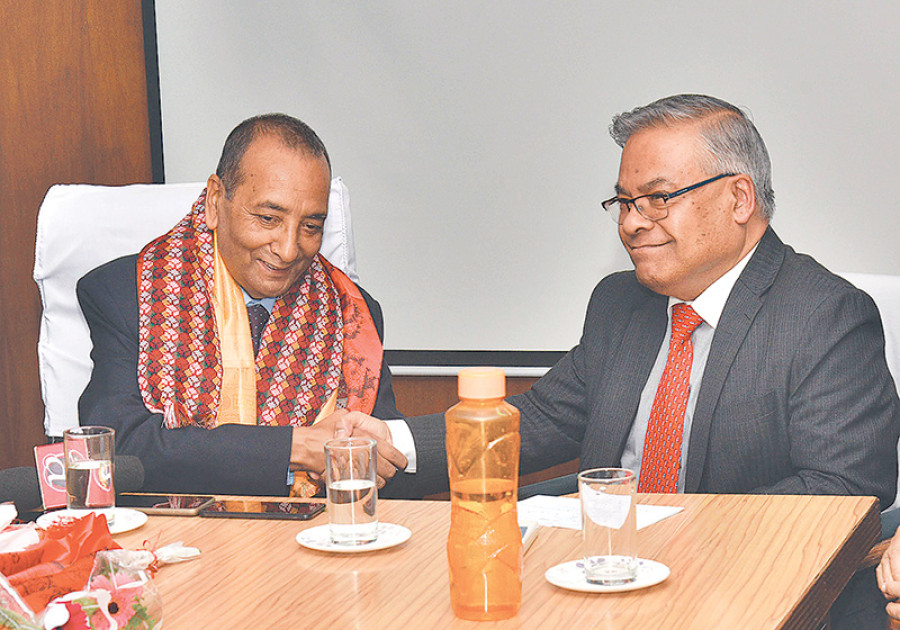Money
Government revives dual power system at NAC
The government has revived the dual executive power system at the Nepal Airlines Corporation (NAC) that could lead to more confusion and conflicts in a place already wrought with so much disorder.
The government has revived the dual executive power system at the Nepal Airlines Corporation (NAC) that could lead to more confusion and conflicts in a place already wrought with so much disorder.
The Cabinet meeting on Sunday appointed Madan Kharel as the executive chairman, leaving incumbent Managing Director Sugat Ratna Kansakar as a ceremonial CEO with no decision-making authority. Officials fear that as a result of this decision, conflicts may arise between Kharel and Kansakar factions as partisanship is popular at the NAC.
Kharel took charge of the office on Monday evening. Kharel, who had been managing director from 2012 to 2015, had previously put in his papers, back in March 2015.
Immediately after Kharel’s appointment on Sunday night, Kansakar tweeted: “An interesting twist in NAC management—former Managing Director Madan Kharel is appointed by the Cabinet meeting as Executive Chairman. But I have decided not to resign, and stay back as “CEO with no executive power”. I know there will be lots of eyebrows raised.”
The Post repeatedly reached out to Kansakar for comment, but to no avail. However, a press statement issued by NAC on Monday said that Kansakar has agreed to help Kharel as an advisor.
Tourism Minister Rabindra Adhikari said that Kharel has been given complete power to run the organisation as he sees fit. “But both Kharel and Kansakar have assured us [the Ministry] that they will work together to uplift the NAC,” he said, adding that the performance of both the bosses would be assessed.
Minister Adhikari said that the government will never forget Kansakar’s contribution in procuring the first-ever long-range Airbus A330 jets for NAC. “But his leadership had been weak on the operational front, which is why we were forced to find his successor.”
Recently, there has been public uproar that despite having 14 aircraft, including five jets for international operation, NAC has not been performing well. The corporation’s performance has been suffering from a lack of pilots and the new planes are frequently grounded incurring heavy losses.
“The Cabinet has appointed me as the executive chairman. I will be overtaking the charge of the corporation as per the government’s decision,” Kharel told the Post. He added he would work together with Kansakar for the betterment of the corporation.
“Because it’s a dual power system, we hope there will be no conflict,” Adhikari said, adding that if tussle appears then the government has alternate options.
However, this is not the first time that the government has exercised a dual executive power system at NAC, and this decision of theirs has not always resulted in the best outcomes. Back in 2008-2011 too, NAC had applied the system, which had brought on constant internal conflicts in the organisation because of the strife between the two top executives Sugat Ratna Kansakar and captain Kul Bahadur Limbu.
The infamous Kansakar-Limbu tussle brought the national flag carrier to its knees, and it rapidly lost its market share both in the international and domestic sectors. The dispute over who was greater began in December 2008, when the then Maoist-led coalition government appointed Kansakar as the managing director in place of Limbu. Shortly after, Limbu filed a case at the Supreme Court, which gave him his old post in June 2009.
However, on July 23, 2009, the Cabinet named Kansakar as the executive chairman, leaving Limbu without any power. Tensions between the two always made headlines then, with each leaving no stone unturned to shame the other. One particularly jarring incident was when Kansakar was arrested on charges of irregularities in NAC’s Airbus purchase deal by the Commission for the Investigation of Abuse of Authority (CIAA), and Limbu could be seen gloating over the arrest.
Tensions flared when the Special Court gave Kansakar a clean chit, and the Tourism Ministry reinstated him at NAC. Limbu reacted by locking up the chairman’s chamber to prevent Kansakar from entering it. When the clash reached fever pitch, the government was forced to take the drastic step of firing both men.
The Cabinet then appointed Manarup Shahi as the new executive chairman on June, 2011. After Limbu’s tenure expired, and Shahi fled following a CIAA probe into the authenticity of his academic certificates, the government decided to select NAC’s next boss through open competition. That was how Madan Kharel was appointed managing director in December 2012.
Tussles at the corporation started again after the government appointed late Shiva Sharan Neupane as the chairman of NAC.
Relations turned sour after Kharel frequently rejected Neupane’s request to give him the responsibility of at least three departments of NAC. After that, every proposal tabled at the board was either rejected or delayed. The
tussles eventually led Kharel to resign.
On May 2015, the Cabinet had reappointed Kansakar as the managing director of the corporation.




 9.6°C Kathmandu
9.6°C Kathmandu














